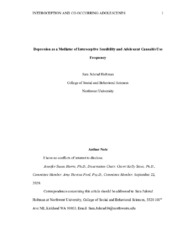Depression as a Mediator of Interoceptive Sensibility and Adolescent Cannabis Use Frequency
Date
September 22, 2020Author
Holtman, Sara Julsrud
Advisor
Harris, Jennifer
Metadata
Show full item recordAbstract
Adolescence is a dynamic and critical period of development that can be become disrupted by cannabis use and symptoms of depression. Interoception has been connected to depression in adolescents, as well as substance use in adolescents, though the literature regarding co-occurring disorders for this age group is sparse. The first aim of this study was to determine if interoception was predictive of cannabis use frequency in adolescents. The second aim was to determine if interoception was predictive of depression. Next, this research sought to examine if depression was predictive of the frequency of cannabis used. Lastly, the overall model of depression serving as a mediator between interoception and cannabis use frequency was explored. Survey data were collected from 93 adolescents between the ages of 15 and 20:11 years from across the United States. Results indicated that low interoception was a strong predictor of increased depression. Higher scores of depression were predictive of increased cannabis use. No significant relationship between interoception and cannabis use, though interoception indirectly influenced cannabis use through depression. These findings suggest that managing symptoms of depression is essential in addressing cannabis use management in adolescents, and that interoception has an important, though indirect, role.
Original item type
PDF
Original extent
79 pages
Collections
Copyright
This original work is protected by copyright. Copyright is retained by the author(s). Works may be viewed, downloaded, or printed, but not reproduced or distributed without author(s) permission.


 Maintained by the Northwest University Library
Maintained by the Northwest University Library